The Mental Illness I Was Too Scared To Even Tell My Therapist About

By:
The summer before starting high school, I told my dad my deepest, darkest secret — something I kept from my current therapist until recently.
Violent images and thoughts will pop into my head during everyday life, and I revealed this to my dad as a teenager, because I was worried something was wrong with my brain. Though I wasn't suicidal, I spent all of fifth grade obsessing over the question, "what if I killed myself?", frequently tossing and turning over this thought.
If I was near a flight of stairs, I couldn't stop thinking about the possibility of pushing another person to the bottom. I'd see a giant battery or avocado seed and wonder, "what if I swallowed that right now?" I'd hold a baby and worry about the fact that I had the power to drop it. I had no desire to do these things, it was actually quite the opposite. Yet the thoughts kept creeping into my mind, making me fear that I was an inherently rotten person, destined for a life of horror. The more I tried to avoid these vicious thoughts and remind myself that I hated them, the more frequently they came to me.
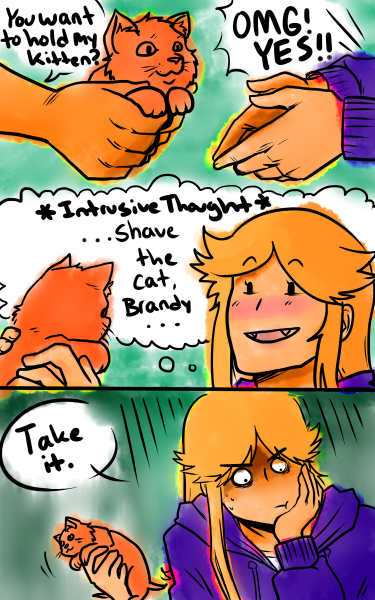 Tumblr / Vampeershizz - tumblr.com
Tumblr / Vampeershizz - tumblr.com
My dad initially thought I suffered from schizophrenia and heard voices, but when I emphasized that I had terrifying unwanted thoughts and wasn't experiencing delusions, he realized I must be dealing with something else. Neither of us could figure out what it was.
During adolescence, he was the only person in the world who knew about my pattern of seemingly uncontrollable scary thoughts, so when he died of cancer right before I started college, he took that awareness of my deepest vulnerability to the grave with him. For years, I thought no one would want anything to do with me if they knew about the twisted, unwanted thoughts swirling around my mind.
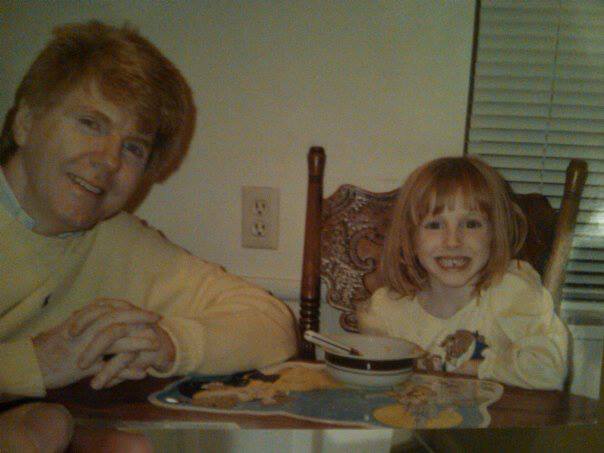 Laura Donovan
Laura Donovan
I didn't know it at the time, but I was experiencing what is called intrusive thoughts, which accompany an uncommon form of obsessive compulsive disorder (OCD) called Pure Obsessional (Pure-O). Sufferers don't necessarily have the overt compulsions typically associated with OCD, but experience repeated intrusive thoughts that are often violent, sexual, or blasphemous.
What does it mean if you have intrusive thoughts?
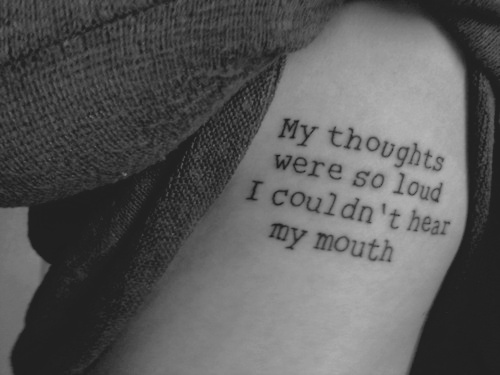 Tumblr - tumblr.com
Tumblr - tumblr.com
Dr. Steven Phillipson, a clinical psychologist who specializes in OCD and coined the term Pure-O, told ATTN: over the phone that almost everyone experiences intrusive thoughts, including him, and he does not suffer from OCD. The difference between regular people and those with OCD, however, is that someone with OCD will fixate on intrusive thoughts and questions their character as a result of having them. It's no wonder OCD is often called the "doubting disorder." In my case, I'd mentally beat myself up for hours or days after having an unwanted thought, but someone who doesn't have OCD won't get hung up on it.
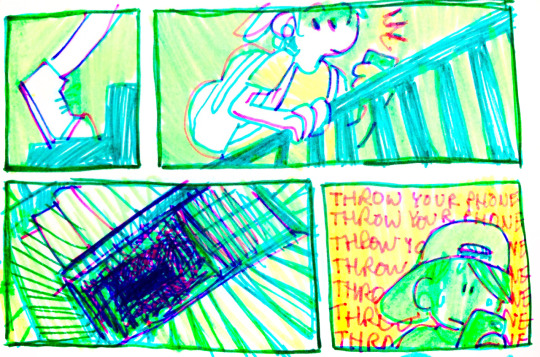 Tumblr - tumblr.com
Tumblr - tumblr.com
Though the term "intrusive thoughts" is recognized by many in the OCD community, however, Dr. Phillipson prefers the description "creative association." It's "important that we don't tag an intolerance to our brain's creativity," he explained. For example, someone might be using a knife to prepare dinner in the kitchen when a thought of stabbing another individual will enter that person's head. This is a creative association, and it is the brain's way of alerting someone to potential (but unlikely) danger, Dr. Phillipson said:
"[Intrusive thoughts mean a person's brain] is functioning in a completely natural and normal way. That's what it means. The human brain is designed to test systems for safety and for adaptive-ness, and so the brain naturally creates associations that test the safety of thoughts that involve violence or sexual association. It's just completely natural to the human condition that our brains do these things.
"The only difference between the non-OCD population and the OCD population is that when these naturally occurring associations occur with the OCD population, the brain reacts physiologically as if there's a crisis occurring. Whereas in the non-OCD population, when the brain creates these associations, the brain has a two to three second moment of heebeegeebees and then the moment kind of moves on. The person might think, 'Oh that was funny or weird,' and then the event is over. So in terms of what does it mean, it means the person's brain is functioning naturally."
The goal, Dr. Phillipson said, is never to try and make these thoughts go away, but to acknowledge their existence and not put so much stock into them, as they are "completely meaningless" and not the same as wanting to harm the world in some way. That said, he recognizes that intrusive thoughts can consume people who have OCD. If you attempt to silence your intrusive thoughts, you might actually have them more.
I know this to be true from personal experience. I've spent the last two years trying to keep intrusive thoughts out of my mind, but the more I obsess over the battle, the more I get stuck on the thoughts.
"If you react to these associations as if they should not occur or as if there's a problem with their occurrence, then the brain tags these thoughts as being relevant or potentially problematic," Dr. Phillipson told ATTN:. "The brain is very well-designed to focus on things that it perceives as a problem. So by resisting or by trying to escape from these thoughts, it highlights for the brain physiologically these thoughts as being an issue. Therefore, the brain will place a lot more emphasis and a lot more tension on those thoughts."
How I finally learned I have Pure-O.
I actively avoided researching my intrusive thoughts out of fear of what I'd find. But after organically stumbling upon a Broadly article on intrusive thoughts, I burst into tears and felt immediate relief that I wasn't alone in feeling tortured by something so disturbing for so long. I went on to join a private online forum with thousands of Pure-O sufferers.
It wasn't a shock to learn I have OCD, as I've displayed other symptoms of it my entire life. As a kid, I refused to eat at restaurants if there was gum underneath the table. These days, I avoid eating on soft surfaces such as booths and cushy chairs because crumbs accumulate in the crevices, and this disgusts me to no end.
My "gross things" aversion makes it harder for me to enjoy meals, and it also seems odd to others (sorry for always hogging the office standing desk, coworkers!), but for me experiencing intrusive thoughts is by far the worst part of having OCD.
The taboo of intrusive thoughts.
As Pure-O sufferer Rose Bretécher noted in a 2013 Guardian article, you can't really communicate your struggles with other people without sounding totally insane. Most people just internalize these thoughts, and this can wear on them a great deal. She wrote:
"Pretty much everything about pure O is secretive. These are things you're not even supposed to think about, let alone talk about. How would a teenage boy tell his parents that he thought about having sex with his sister, a thousand times a day? What if you were a mother and you kept having thoughts about drowning your baby in the bath? Or a gay man who kept having thoughts about vaginas when you made love to your husband? How would you begin to talk about it? You'd keep it secret for years; for your whole life, perhaps."
 Rose Bretécher Twitter - twitter.com
Rose Bretécher Twitter - twitter.com
Bretécher, who had sexual intrusive thoughts for more than a decade before tackling the issue head on, told Sky News earlier this year that OCD made her feel like such a terrible person; it was as if she'd committed a murder just by having intrusive thoughts.
"I thought I'd committed some horrendous act of thought crime just by having had [a thought of a naked little boy]," she said. "It felt like I'd killed someone and I had a body in the backyard. That's what it felt like. That was the kind of terror [I had]. 'Oh my god, I've done something horrendous, I've thought something so terrible, I've committed an unforgivable sin and my life is never going to be the same again,' [I'd think]. That was the terror. It was doom, really. It was nightmarish."
My fiancé has known I suffer from intrusive thoughts since they started bothering me again two years ago, and though he has occasionally become frustrated hearing me recount the same anxieties over and over again, he is always there to assure me that a thought is just a thought and doesn't have anything to do with my character. Those who suffer from Pure-O must repeatedly tell themselves this to cope with the unwanted thoughts and images in their minds.
Getting help.
Aaron Harvey, a founding partner of New York City-based digital agency Ready Set Rocket, recently launched the website IntrusiveThoughts.org to spread awareness and provide resources to those suffering from it. Having experienced intrusive thoughts for decades, Harvey wants to help people today who might assume they're bad people because of their thoughts.
Since the project went live, tons of people have contacted Harvey to admit that they have intrusive thoughts and appreciate the clarity he has given them.
"I've been reached out to through every form of communication possible from Facebook, in a public way to private messages and texts from family members and friends," Harvey told ATTN: over the phone. "I've heard from people I've known for a long time, one in particular is a friend of mine who told me that she had these types of feelings when she had her daughter and struggled with the idea of giving her daughter up for adoption for the first five years of her life."
Other obstacles to coming forward about suffering from intrusive thoughts.
A part of me is worried about how loved ones and coworkers will perceive me after reading this article. Harvey faced similar concerns about what his intrusive thoughts venture will mean for him professionally. Harvey recently wrote about IntrustiveThoughts.org in a piece for Fast Company, and the night before the story went live, he wondered whether this could hurt his business prospects, impact the way colleagues view him, or affect client relations. Even so, the desire to help others is Harvey's top priority.
"All of those things absolutely go through your mind but I had to just center back to 'what is my goal?'" he said. "My goal is to make sure that the next 13-year-old version of me doesn't have to [suffer] silently for twenty years and make sure that people who are on the wrong treatment and wrong medications get on the right treatment."
Like many people battling intrusive thoughts and OCD, Harvey has sought treatment through Exposure Response Prevention (ERP), a form of Cognitive Behavioral Therapy (CBT) that helps sufferers directly confront their fears and anxieties. Though he is happy to have this guidance, Harvey said that some people with OCD and intrusive thoughts are misdiagnosed.
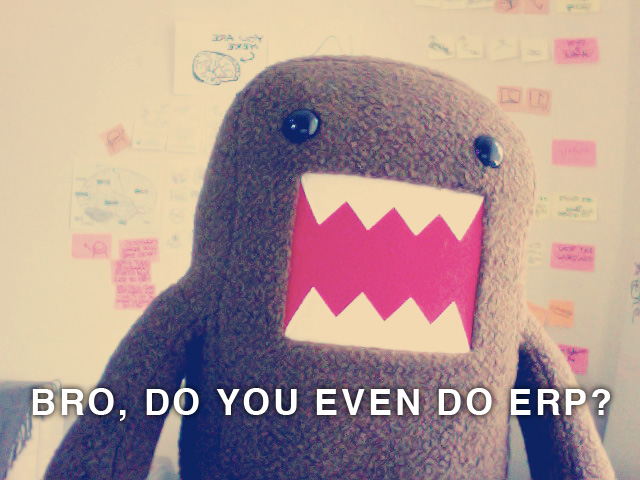 Tumblr / OCDfree - tumblr.com
Tumblr / OCDfree - tumblr.com
"Sadly, I very frequently hear or read about people getting the wrong diagnoses," Harvey told ATTN:. "In fact, my ERP therapist was telling me that she has a patient who was diagnosed with schizophrenia and was forced to be hospitalized for months and they just had OCD. There's a lot of that going on out there. There's a lack of knowledge among practitioners and it's really sad what's happening. Kids are getting put on the wrong drugs. I think everyone needs equal education: the sufferers, the practitioners, the parents."
Dr. Phillipson has also witnessed those with OCD receive improper assistance. He once met an FBI agent who had intrusive thoughts of shooting his partner and wife; a social worker suggested he seek another profession.
"[T]his FBI agent carried around an incredibly lethal weapon at all times," Dr. Phillipson said. "He told a social worker that the FBI had recommended for him, and the social worker told him he might want to find a different career. I was absolutely outraged at that response because that social worker had no clue about the nature of OCD. This person had dreamed his entire life of being an FBI agent and was given the absolute worst feedback he could have possibly been given by that social worker."
Dr. Phillipson said that this FBI agent showed immense improvement after six months of treatment and remains "an incredibly decorated member of the FBI because he performed his tasks and treatment completely skillfully." But this might not have been possible had he jumped on the wrong path to recovery.
For those who lack the money or access to ERP or OCD specialists, Harvey recommends meditation and mindfulness.
"I think for a lot of people not in major markets like New York [and similar big cities] might find it hard to find that type of service," Harvey told ATTN:. "I think if someone gets in that situation where they don't have that locally provided [service] or they can't afford it, there is Skype and other means. I think really focusing on meditation and mindfulness is going to be the most beneficial thing they can do. More beneficial than medication."
In addition to undergoing ERP therapy, playing music, surfing, and staying busy with work, Harvey told ATTN: that he has turned to humor to cope with his intrusive thoughts.
"Obviously, I've lived a long time with this," Harvey told ATTN:. "I really use humor as a primary way to deal with it. I came to the conclusion early on that my mind just fucks with me all the time. I'm just going to turn those thoughts into things that are kind of funny to say out loud. So I can always tell the joke that goes a little bit too far."
Accepting and moving beyond the fear that Pure-O creates.
What crippled me for so long was not knowing the reason for my intrusive thoughts or whether or not there were others like me in the world. As Harvey and Bretécher could tell you, there is so much isolation in quietly going through this, but once I learned that I was far from alone, I felt like I could finally put this problem behind me.
I'm no longer ashamed of those years of on-and-off suffering. I look back on them with recognition that I didn't have the tools to help myself in the past. I also know that I wasn't ready to tell my therapist about these troubles until I found out that intrusive thoughts are a real problem for many people.
For too long, I've told myself that I don't deserve my dream job, my wedding, my family, and my friends because of the way my mind works. I've come to see that this couldn't be further from the truth. Whether they experience intrusive thoughts or something else, everyone I know faces inner turmoil, and the help we give each other is so much more powerful than any thought I could have.
Go to IntrusiveThoughts.org for help coping with intrusive thinking.
